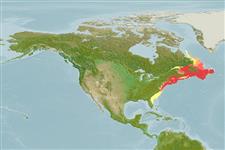Common names from other countries
Environment: milieu / climate zone / depth range / distribution range
Ecologia
marino demersale; oceanodromo (Ref. 51243); distribuzione batimetrica 0 - 800 m (Ref. 27549). Temperate; 60°N - 28°N, 82°W - 43°W
Western Atlantic: New Foundland and Labrador in Canada to northeastern Florida in USA, but uncommon in nearshore waters south of North Carolina, USA.
Length at first maturity / Size / Peso / Age
Maturity: Lm 46.5 range ? - ? cm
Max length : 120 cm TL maschio/sesso non determinato; (Ref. 7251); common length : 90.0 cm TL maschio/sesso non determinato; (Ref. 3787); peso massimo pubblicato: 22.6 kg (Ref. 40637); Età massima riportata: 30 anni (Ref. 796)
Inhabits continental shelf, occurring deeper in southern parts of range (Ref 7251); tolerating a wide range of temperature (0-21°C) (Ref. 5951).
That testes seem to develop earlier and stay ripe longer suggest multiple spawning by males. Eggs are laid in long, ribbon-shaped veils (Ref. 4842).
Robins, C.R. and G.C. Ray, 1986. A field guide to Atlantic coast fishes of North America. Houghton Mifflin Company, Boston, U.S.A. 354 p. (Ref. 7251)
IUCN Red List Status (Ref. 130435)
CITES (Ref. 128078)
Not Evaluated
Threat to humans
Harmless
Human uses
Pesca: elevato interesse commerciale; Pesce da pesca sportiva: si
Informazioni ulteriori
CollaboratoriImmaginiStamps, Coins Misc.SuoniCiguateraVelocitàModalità di nuotoArea branchialeOtolithsCervelliVista
Strumenti
Special reports
Download XML
Fonti Internet
Estimates based on models
Preferred temperature (Ref.
115969): 0.6 - 9.9, mean 5 (based on 189 cells).
Phylogenetic diversity index (Ref.
82804): PD
50 = 0.5078 [Uniqueness, from 0.5 = low to 2.0 = high].
Bayesian length-weight: a=0.01380 (0.01040 - 0.01833), b=2.98 (2.90 - 3.06), in cm Total Length, based on LWR estimates for this species (Ref.
93245).
Trophic level (Ref.
69278): 4.5 ±0.3 se; based on diet studies.
Resilienza (Ref.
120179): Basso, tempo minimo di raddoppiamento della popolazione 4.5 - 14 anni (K=0.06-0.1; tmax=30; Fec=300,000).
Fishing Vulnerability (Ref.
59153): Very high vulnerability (77 of 100).
Climate Vulnerability (Ref.
125649): Moderate vulnerability (41 of 100).
